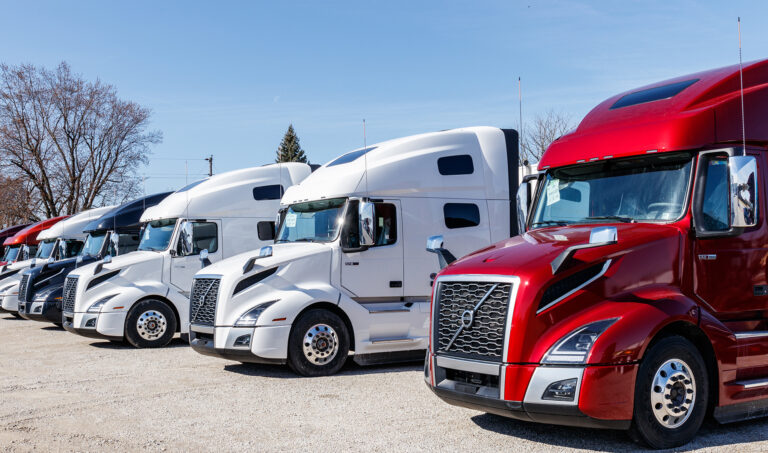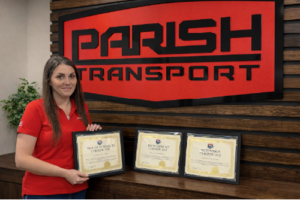Financial reports for the second quarter of 2020 (April-June) recently released by four major OEMs — Daimler, Navistar, PACCAR and Volvo — reflect the continuing impact of the COVID-19 pandemic on commercial-vehicle sales.
DAIMLER TRUCKS
Daimler, a German manufacturer of passenger vehicles, buses, and light-, medium- and heavy-duty trucks, reported in a July 23 statement that the group’s total unit sales for all categories saw a 34% drop compared to the second quarter of 2019.
In addition to the Freightliner and Western Star commercial trucks that are commonly used in North America, Daimler produces Mercedes-Benz, FUSO and BharatBenz trucks; Mercedes-Benz and Smart passenger cars; Mercedes-Benz vans; and Daimler and Thomas Built buses.
“Due to the unprecedented COVID-19 pandemic, we had to endure a challenging quarter,” said Ola Källenius, chairman of the board of management of Daimler AG and Mercedes-Benz AG. “But our net industrial liquidity is a testament to effective cost control and cash management, which we must continue to enforce. We are now seeing the first signs of a sales recovery.”
From April 1 to June 30, 2020, Daimler’s truck division saw sales of 57,945 units compared to 126,474 during the same time frame last year, a drop of 38%. Revenue for combined truck and bus sales fell 31% with a tally of $7,287 million USD (€6,200 million). The truck and bus division ended the quarter in the red, with an EBIT (earnings before interest and taxes) of -$888 million USD (-€756 million). The second quarter of 2019, the division showed an EBIT of $980 million USD (€834 million).
To view the entire report, click here.
NAVISTAR
Best known in the trucking industry as the producer of International tractors, Illinois-based Navistar reported a 36% drop in revenue for the year’s second quarter compared to the second quarter of 2019. Navistar also manufactures military defense vehicles and school buses.
“Like a number of businesses, our company has been impacted by the COVID-19 pandemic, and that is reflected in our results,” said Troy Clarke, Navistar’s chairman, president and CEO. “Our team has done a tremendous job managing the business through this challenging time, and we have taken a number of steps to position the company to weather this crisis.”
In April, Navistar announced a series of actions designed to conserve more than $300 million in cash for the year, including savings from provisions under the CARES Act, postponing capital expenditures and spending, and deferring the base salary of U.S. based exempt, nonrepresented employees.
“As an essential business, we took early actions to protect our people so that we could fulfill our duty to keep our assembly plants running and parts-distribution centers in operation to serve our customers and dealers who are keeping the economy moving by delivering essential goods and services to our communities,” said Persio Lisboa, Navistar’s chief operating officer. “Throughout the quarter, we have worked closely with our suppliers to overcome significant disruptions to the flow of parts to our facilities and have been moderately successful in maintaining operations.”
During 2020’s second quarter, Navistar’s truck segment saw sales of $1.4 billion, a decrease of $907 million compared to the same time frame last year. In addition, the truck segment suffered a net loss of $51 million during the quarter, an improvement over the $74 million loss recorded April-June 2019.
To view the entire report, click here.
PACCAR
According to a July 21 statement from PACCAR, a Bellevue, Washington-based company that produces Kenworth, Peterbilt and DAF commercial vehicles, saw net sales and revenues of $3.06 billion during the second quarter of 2020, less than half of the $6.63 billion the company reported during the same time period in 2019.
“PACCAR achieved good quarterly revenues and net income in the second quarter of 2020,” said Preston Feight, CEO of PACCAR, adding that the company’s factories were closed during the first five weeks of the quarter due because of the COVID-19 pandemic.
The sites have “gradually resumed production with enhancing operating processes and procedures for employee health and well-being, manufacturing efficiency and customer satisfaction,” he continued. “I am very proud of our outstanding employees who delivered excellent production and distribution performance while enhancing PACCAR’s rigorous health and safety standards.
PACCAR’s reported EBIT was $2,701.9 million in net sales and revenues for its “trucks, parts and other” division from April to June 2020, compared to $6,266.5 million for the same quarter last year.
To view the entire report, click here.
VOLVO
Volvo’s heavy-duty truck segment, which includes Volvo and Mack brand commercial trucks, reported a “significant” volume drop in sales during 2020’s second quarter, with a net sales drop worldwide of 46% and a 45% decline in order intake, according to a July 17 statement.
“The second quarter of 2020 was characterized by the COVID-19 pandemic and its negative effects on society and economic development,” said Martin Lundstedt, president and CEO of the Volvo Group. “Measures adopted by countries to control the spread had a significant impact on our production and supply chain as well as on demand for our products and services.”
Volvo’s North American order intake was down 44% to 4,179 trucks, and deliveries plummeted by 79% to 3,925 trucks. However, the company reports that market shares for Volvo trucks remained steady at 9.3% while Mack Trucks’ share rose to 7.6%.
“We also took forceful actions to reduce activities and costs, including salary reductions, temporary layoffs as part of governmental programs, and a reduction of purchased services,” Lundstedt noted.
As part of the global downsizing, Mack Trucks and Volvo Trucks North America recently announced that 450 salaried workers at the North Carolina headquarters would be laid off, but Mack does not anticipate trimming production jobs at the Pennsylvania plant, according to Mack spokesperson Christopher Heffner.
To view the entire report, click here.
Linda Garner-Bunch has been with The Trucker since 2020, picking up the reins as managing editor in 2022. Linda has nearly 40 years of experience in the publishing industry, covering topics from the trucking and automotive industry to employment, real estate, home decor, crafts, cooking, weddings, high school sports — you name it, she’s written about it. She is also an experienced photographer, designer and copy editor who has a heartfelt love for the trucking industry, from the driver’s seat to the C-suite.












Major OEMs’ second-quarter reports reflect continued impact of COVID-19
Comment